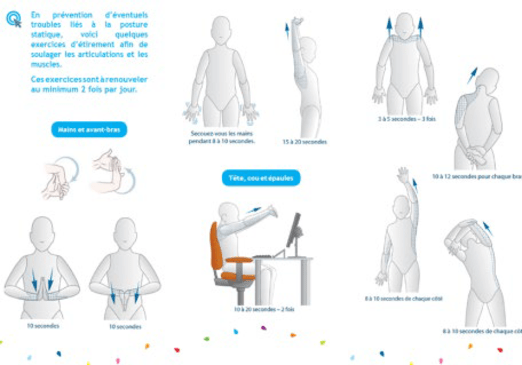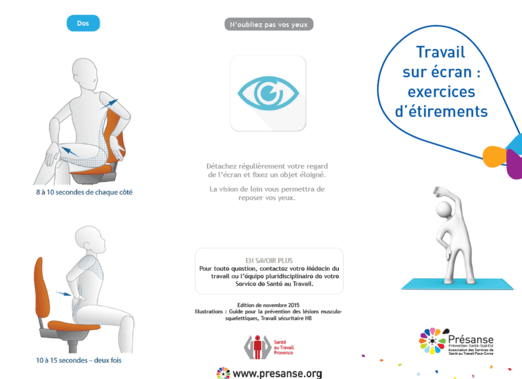Discover the best practices you can adopt to telework in optimal conditions and make the most of your confinement!
In these difficult times of confinement, we'd like to help you make the most of your remote working conditions.
- - Onet
5 best practices for teleworking
1 - Keep your usual working hours
- Try to find a work/life balance (self-regulation of your working hours).
- Define the times when you're available to be reached, according to your constraints.
- Prioritize your tasks by making a to-do list.
2 - Collectively define your team's communication methods
- Identify ways of contacting your team members (e-mail, telephone)
- Specify how your manager or other employees can contact you individually (telephone number, e-mail, availability times, shared diary....)
- Establish the frequency and nature of exchanges within the team (information-sharing time/work time, individual time/group time, etc.).
- Be sure to specify the tools you will be using (video, tel, etc.) and make sure the associated user guides are available and/or encourage colleagues to help each other make the tools their own.
- Schedule regular (daily or weekly) telephone or video conferences in your diaries. (Reservation via https://www.videoconferencing.orange-business.com/auth/login.html + user manual on the intranet portal).
3 - Organizing your workspace
- Optimize your ability to concentrate by setting up a dedicated teleworking space, or if that's not possible, plan to inform those around you when you're communicating.
- Make yourself comfortable at your workstation by ensuring that your posture is correct.

4 - Checking your computer equipment
- Make sure you have all the equipment you need to work remotely (sufficient bandwidth, computer, online files), installed collaborative work tools, access to shared spaces.
- Ensure that connections do not generate electrical hazards.
- Respect the rules set up by DSINI (see our intranet portal: Gestures Digital Barriers and Rules for the Use of Computer Resources on the portal).
5 - Taking care of yourself
Getting up every hour:
- To drink a glass of water
- Resting your eyesight
- Stretching


Recommendations for coping with confinement
1 - Media sparingly
Be informed by the media as needed, to avoid the anxiety-inducing effects of listening to bad news for too long.
Approximately 30 minutes to 1 hour/day can be considered more than sufficient.
2 - Regular physical activity
Take regular exercise in accordance with health regulations. This advice is particularly valid in confinement situations.
The Internet makes it possible to find sports sessions that are perfectly feasible at home, or in a restricted environment.
3 - A healthy lifestyle
Maintain a healthy lifestyle: in the absence of social obligations or contact with others, it's possible to observe a deterioration in lifestyle, yet this lifestyle remains essential for maintaining good self-esteem and stress management.
Eat a balanced diet, expose yourself to daylight, take care of your personal hygiene, maintain your wake-up and bedtime rhythms, relax, maintain a balance between work, family and social life, consume alcohol and tobacco in moderation, avoid drugs and other addictions, etc.
4 - Keeping in touch & communicating
Maintain contact with those closest to you through long-distance communications, both written and spoken. This is particularly important with workmates and isolated friends.
It's even possible to have fun together remotely, thanks to a wide range of resources: video games, films viewed and commented on simultaneously, discussion groups, etc.
In particular, keep in touch with family members or members of the work team who can no longer receive visitors, as well as with staff who may be currently isolated.
5 - Organizing working hours and teleworking
Organize your time, for example by drawing up a schedule in advance to define your activities: work, sport, leisure, time with loved ones, etc. This helps to establish a rhythm and healthy habits.
It's even possible to set targets for the end of confinement.
As far as possible, dedicate a specific space to work, establish rituals at home to mark the work times of the day, communicate with loved ones about the reason for teleworking, and the importance of respecting the need for calm and isolation.
As a reminder, a professional, neutral and confidential helpline is available for psychological support in case of need, via a toll-free number (available on the intranet portal).
6 - And after confinement?
Anticipate the end of confinement and the transition to something new.
No one knows what the precise consequences will be when the crisis ends, but it's important to continue to anticipate and plan ahead.
If you have any questions, please do not hesitate to contact the Human Resources Department. Please pass on these best practices to all employees.




